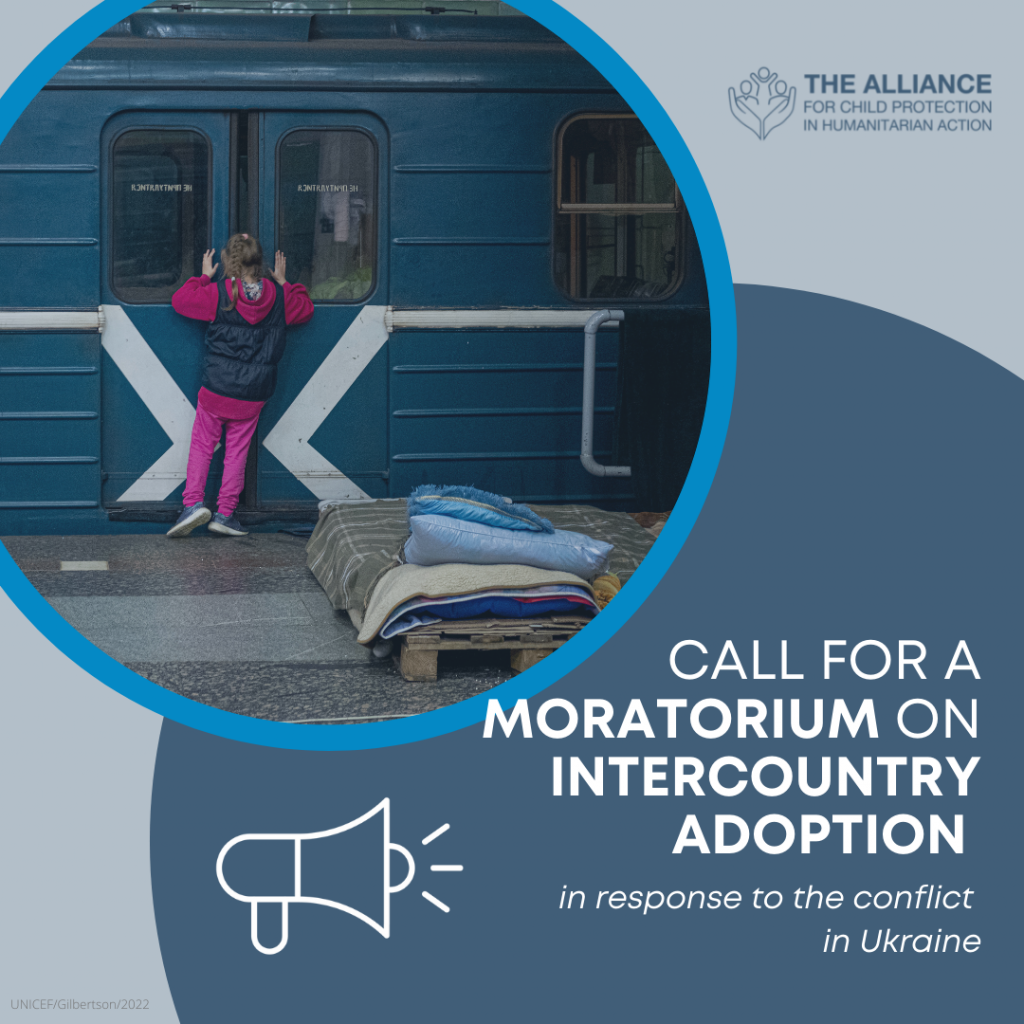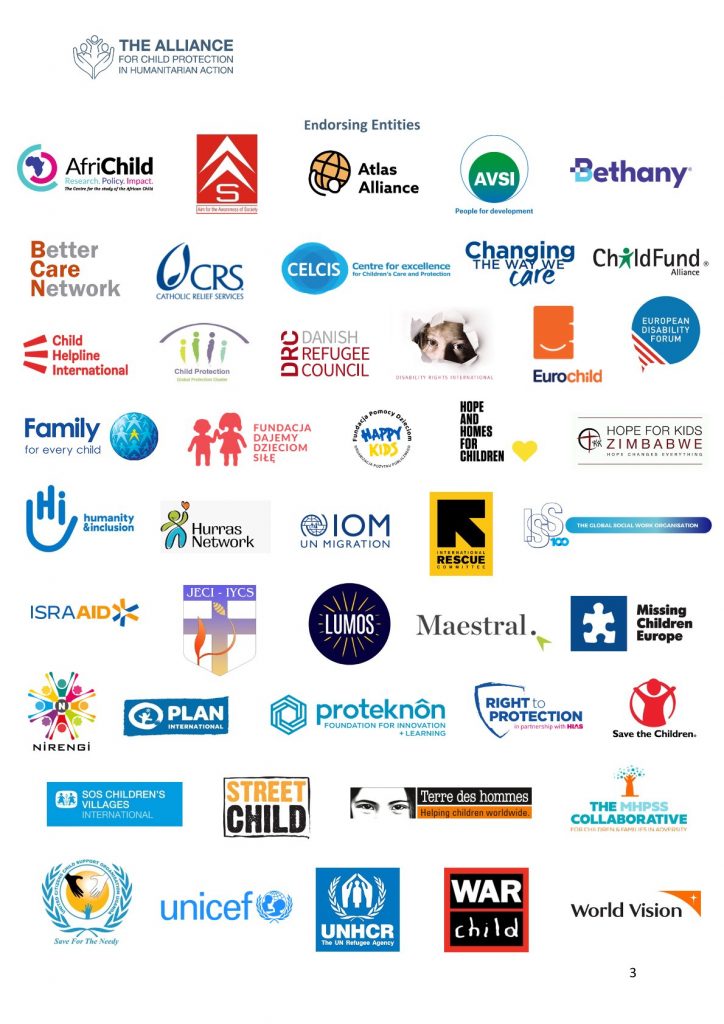-
Unfortunately, nothing was found for your request, you can search for another keyword, or contact us with your question through the feedback form
Search results (25)
All results (25)
Call for a moratorium on intercountry adoption in response to the conflict in Ukraine
May 25, 2022
Intercountry adoption should not occur during or immediately after an emergency.2 In line with the Ukrainian Government’s suspension of intercountry adoption,3 we urge receiving States, international bodies, and humanitarian agencies to adopt a harmonised approach and call for a moratorium on intercountry adoptions from Ukraine1.
During emergencies, such as conflict, it is a well-accepted principle of States’ obligations under international law that adoption is not an appropriate response for unaccompanied and separated children. Children separated from their parents during a humanitarian emergency cannot be assumed to be orphans. Until the fate of a child's parents or other close relatives can be verified, each separated child should be considered as still having living relatives or legal guardians and, therefore, is not in need of adoption. Every effort should be made to reunify children with their families when possible, if such reunification is in their best interest.4 This includes children who were living in residential care facilities when the crisis escalated, many of whom are children with disabilities. This is echoed in UNHCR’s Policy on the Adoption of Refugee Children.5
Intercountry adoption should only be considered once all family tracing and reunification efforts have been exhausted and stable in-country solutions, including kinship care, foster care, and national adoptions have been considered in accordance with the principle of subsidiarity.6 In an emergency, it can be very difficult, if not impossible, to ensure that international standards and safeguards are respected in accordance with the 1993 Hague Convention on Protection of Children and Co-operation in Respect of Intercountry Adoptions and the Convention on the Rights of the Child. Even though Ukraine is not a Party to the 1993 Adoption Convention, all receiving States should apply its standards and safeguards when cooperating with Ukraine.

According to International Social Service (ISS) worldwide statistics, provided by States to the Hague Conference on Private International Law (HCCH), Ukraine facilitated the second highest number of intercountry adoptions in 2020.7 In times of peace, a child should only be considered for intercountry adoption based on the best interests of the child, with full respect for the rights of the child. This includes establishing that the child is adoptable,8 the child has been consulted and well-informed in line with his/her evolving capacity, all suitable placement options in the country have been considered
and exhausted in accordance with the principle of subsidiarity, the prospective adoptive parent(s) is (are) eligible to adopt the child in question, there is consent by those legally acting on the child’s behalf, including that the consent of the mother is given only after the birth of the child, and information about the child and their parents’ identity is preserved. Such considerations may be particularly challenging for States like Ukraine that are not parties to the 1993 Adoption Convention.
Conflict is a breeding ground for illicit practices, in part because of the breakdown of oversight. Separated and unaccompanied children are extremely vulnerable to trafficking and exploitation; including illicit practices in adoption. The ongoing crisis makes it impossible to ensure that commercial or criminal gain, fraud, child trafficking, and the deception of birth parents do not play any part in the adoption process. The UN Guidelines for the Alternative Care of Children state that children in emergency situations should not be moved to a country other than their habitual residence for alternative care except for compelling health, medical or safety reasons. When a child must be moved, they should stay as close as possible to their home, be accompanied by a parent or caregiver, and have a clear plan of return.9 10
In the aftermath of children’s displacement to neighbouring countries, adequate identification and registration measures must be in place and appropriate alternative care arrangements provided in line with the UN Guidelines for the Alternative Care of Children and the Convention on the Rights of the Child.11 The conflict should not be used as a justification for expediting intercountry adoptions, or for circumventing or disregarding the internationally accepted framework. This applies equally to adoption procedures that were already under way prior to the conflict.
This statement remains open for endorsement until the end of June 2022. As new endorsements come in, the statement will be updated once a week. New endorsements should be sent to [email protected], with the name of the organization and a high-resolution logo.

1 This statement was developed with contributions from the sub-group on care under the UASC Task Force, co-led by the Transforming Children's Care Global Collaborative Platform
2 In line with the recommendations from the Permanent Bureau of HCCH (16 March 2022): https://assets.hcch.net/docs/0f9c08e9-75d0-4497-8ca0-12c595aa6845.pdf
3 The Government of Ukraine Statement: https://www.unicef.org/ukraine/en/stories/help-unaccompanied-child-during-war in-Ukraine [accessed 11 April 2022] also referred to in the UNICEF statement updated on the 24th of March: https://www.unicef.org/ukraine/en/stories/help-unaccompanied-child-during-war-in-Ukraine
4 Rights of the child: realizing the rights of the child and family reunification. OHCHR | HRC | 49th regular session of the Human Rights Council: Resolutions, decisions and President’s statements - https://www.ohchr.org/en/hr-bodies/hrc/regular sessions/session49/res-dec-stat
5 UN High Commissioner for Refugees (UNHCR), UNHCR Policy on Adoption, 22 August 1995, available at: https://www.refworld.org/docid/42f9c3714.html [accessed 11 April 2022]
6 The principle of subsidiarity according to the Hague Convention on Intercountry Adoption is that “States Party to the Convention recognise that a child should be raised by his or her birth family or extended family whenever possible. If that is not possible or practicable, other forms of permanent family care in the country of origin should be considered. Only after due consideration has been given to national solutions should intercountry adoption be considered”. The Implementation and Operation of the 1993 Hague Intercountry Adoption Convention: Guide to Good Practice (Bristol, U.K.: Family Law, 2008), p. 29, Hague Conference on Private International Law, assets.hcch.net/docs/bb168262-1696-4e7f-acf3-fbbd85504af6.pdf 7 The latest available data reports 277 intercountry adoptions facilitated by Ukraine in 2020. International Social Service (December 2021) Monthly Review No. 257
8 Establishing whether a child is adoptable, or eligible for adoption, States must go through the legal process of determining if a child has a birth family that is willing or able to care for him/her. This includes supporting the birth family to care for the child, family tracing and reunification if children are separated from their caregivers and verifying who has legal guardianship of the child.
9 UN Guidelines for the Alternative Care of Children (2010). https://digitallibrary.un.org/record/673583?ln=en (see paras 146,160,166)
10 In full respect of the non-refoulement principle for refugees.
11 Convention on the Rights of the Child (Articles 20 and 22), Committee on the Rights of the Child, General Comment 6 (2005) [para 31 (ii)].s
